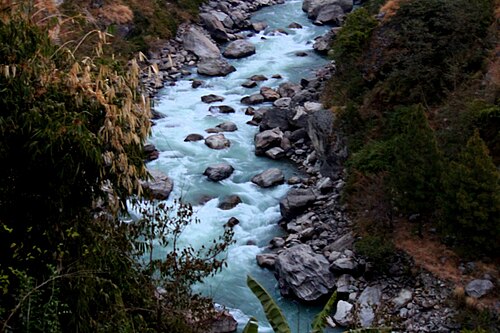Nepal's rivers, vital for ecological balance and millions of livelihoods, are increasingly at risk due to the neglect of environmental flow (E-flow) in hydropower and irrigation projects. Despite policy provisions and growing concerns from water resource experts, the enforcement of E-flow remains inadequate, threatening river ecosystems and dependent communities.
What is Environmental Flow?
Environmental flow refers to the volume, timing, and quality of water necessary to sustain the ecological health of rivers and streams while supporting communities that rely on them. Beyond ecological significance, rivers in South Asia, including Nepal, hold cultural and spiritual importance. However, achieving sustainable E-flow does not mean reverting rivers to their natural state but striking a balance between human benefits—such as hydropower, irrigation, and drinking water—and preserving the broader ecological and cultural value of rivers.
Policy and Reality: A Wide Gap
Nepal’s hydropower policy, enacted over two decades ago, mandates that all projects must maintain at least 10% of a river's natural flow to sustain ecosystems. However, studies indicate that nearly 80% of hydropower projects fail to comply with this requirement. A recent study of 50 hydropower plants revealed that most projects release negligible or no water during dry seasons, leaving river stretches waterless.
Consequences of Non-Compliance
This negligence has severe consequences:
Ecological Impact: River sections rendered dry by water diversions severely harm aquatic life, including fish species and other organisms dependent on flowing water.
Livelihoods at Risk: Local communities relying on rivers for irrigation face reduced agricultural productivity due to inadequate water supply.
Projects Without River Health in Mind
Nepal is increasingly investing in hydropower, with 160 projects (total capacity 3,000 MW) completed, 10,000 MW under construction, and an additional 8,000 MW under survey. Most of these projects prioritize energy production while disregarding river health.
Expert Voices Call for Action
At a recent workshop in Kathmandu organized by the International Water Management Institute (IWMI) and the Department of Water Resources and Irrigation, experts called for urgent measures to enforce E-flow in all river-related projects.
Assistant Professor Dip Narayan Shah from Tribhuvan University highlighted the stark reality: “The majority of hydropower projects in Nepal fail to release the required water to maintain E-flow, particularly during the dry season.”
Ramadevi Tachamo Shah, Assistant Professor at Kathmandu University, emphasized the need for public awareness and stakeholder training to enforce E-flow regulations. "Protecting the health of every river is non-negotiable," she said.
A Call for Sustainable Solutions
Former Water Resources Minister Dipak Gyawali argued for the localization of river-based projects, stressing that Environmental Impact Assessments (EIAs) must address local concerns to ensure sustainable development.
Nepal’s new water resource bill, currently under parliamentary consideration, could offer a lifeline for rivers if it incorporates robust provisions for E-flow enforcement. Experts believe that proper implementation of E-flow regulations is critical for maintaining river health and ensuring sustainable water use.
The Way Forward
With 6,000 rivers and streams, Nepal stands at a crossroads. The country must shift its focus from exploiting rivers for energy and irrigation to adopting an integrated approach that balances development with ecological sustainability. Failure to act now could lead to irreversible damage to its rivers and the communities that depend on them.